- Home
- Don DeLillo
Point Omega Page 3
Point Omega Read online
Page 3
The liturgical gloom was gone from his voice. He was tired and detached, too separated from events to do justice to his resentment. I made it a point not to provoke further comment. It would come when it mattered, self-generated, on-camera.
He finished his scotch but kept the mug nestled near his beltline. I was drinking vodka with orange juice and melted ice. The drink was at that stage in the life of a drink when you take the last bland sip and fade into rueful introspection, somewhere between self-pity and self-accusation.
We sat and thought.
I glanced over at him. I wanted to go to bed but didn't think I should leave before he did, not sure why, I'd left him there on other nights. It was dead still in the room, in the house, everywhere out there, windows open, nothing but night. Then I heard a mousetrap being triggered in the kitchen, hammer releasing, trap jumping.
There were three of us now. But Elster didn't seem to notice.
In New York he used a cane that he didn't need. He may have been feeling routine soreness in one knee but the cane was an emotional accessory, I was sure of this, adopted soon after his dismissal from the ministries of News and Traffic. He spoke vaguely of a knee replacement, talking more to himself than to me, making an argument for self-pity. Elster tended to be everywhere, in all four corners of a room, gathering impressions of himself. I liked the cane. It helped me see him, it lifted him from public print, a man who needed to live in a protective hollow, womblike and world-sized, free of the leveling tendencies of events and human connections.
In these desert days few things roused him from apparent calm. Our cars had four-wheel drive, this was essential, and after all his years here he seemed to be adjusting, still, to off-road driving, or any driving, anywhere. He asked me to program the GPS unit in his car. He wanted the system to be utilized, dared the system to work. He was grudgingly satisfied when it told him, in a spare male voice, what he already knew, right turn in one point four miles, leading him to the parking lot of the food market in town, twenty-five miles there, twenty-five back. He cooked for us every night, insisted on making dinner, showing no sign of the wariness people his age tend to feel about certain foods and how they affect the body that consumes them.
I took drives of my own looking for remote trailheads and then just sat in the car, conjuring the film, shooting the film, staring out at sandstone wastes. Or I drove into box canyons, over hard dry cracked earth, car swimming in heat, and I thought of my apartment, two small rooms, the rent, the bills, the unanswered calls, the wife no longer there, the separated wife, the crackhead janitor, the elderly woman who walked down the stairs backwards, slowly, eternally, four flights, backwards, and I never asked her why.
I talked to Elster about an essay he'd written a few years earlier, called "Renditions." It appeared in a scholarly journal and soon began to stir criticism from the left. This may have been his intention but all I could find in those pages was an implied challenge to figure out what the point was.
The first sentence was, "A government is a criminal enterprise."
The last sentence was, "In future years, of course, men and women, in cubicles, wearing headphones, will be listening to secret tapes of the administration's crimes while others study electronic records on computer screens and still others look at salvaged videotapes of caged men being subjected to severe physical pain and finally others, still others, behind closed doors, ask pointed questions of flesh-and-blood individuals."
What lay between these sentences was a study of the word rendition, with references to Middle English, Old French, Vulgar Latin and other sources and origins. Early on, Elster cited one of the meanings of rendering-a coat of plaster applied to a masonry surface. From this he asked the reader to consider a walled enclosure in an unnamed country and a method of questioning, using what he called enhanced interrogation techniques, that was meant to induce a surrender (one of the meanings of rendition-a giving up or giving back) in the person being interrogated.
I didn't read the piece at the time, knew nothing about it. If I had known, before I knew Elster, what would I have thought? Word origins and covert prisons. Old French, Obsolete French and torture by proxy. The essay concentrated on the word itself, earliest known use, changes in form and meaning, zero-grade forms, reduplicated forms, suffixed forms. There were footnotes like nested snakes. But no specific mention of black sites, third-party states or international treaties and conventions.
He compared the evolution of a word to that of organic matter.
He pointed out that words were not necessary to one's experience of the true life.
Toward the end of the commentary he wrote about select current meanings of the word rendition-interpretation, translation, performance. Within those walls, somewhere, in seclusion, a drama is being enacted, old as human memory, he wrote, actors naked, chained, blindfolded, other actors with props of intimidation, the renderers, nameless and masked, dressed in black, and what ensues, he wrote, is a revenge play that reflects the mass will and interprets the shadowy need of an entire nation, ours.
I stood in a corner of the deck, out of the sun, and asked him about the essay. He waved it away, the entire subject. I asked him about the first and last sentences. They seem out of place in the larger context, I said, where crime and guilt don't get mentioned. The incongruity is pretty striking.
"Meant to be."
Meant to be. Okay. Meant to unsettle critics of the administration, I said, not the decision makers. Flat-out ironic.
He sat in an old reclining chair he'd found in the shed behind the house, a beach chair out of its element, and he opened one eye in lazy disdain, measuring the fool who states the obvious.
Okay. But what had he thought of the charge that he'd tried to find mystery and romance in a word that was being used as an instrument of state security, a word redesigned to be synthetic, concealing the shameful subject it embraced.
But I didn't ask this question. Instead I went inside and poured two glasses of ice water and came back out and sat in the chair alongside him. I wondered if he was right, that the country needed this, we needed it in our desperation, our dwindling, needed something, anything, whatever we could get, rendition, yes, and then invasion.
He held the cold glass to the side of his face and said he was not surprised by the negative response. The surprise came later, when he was contacted by a former university colleague and invited to a private meeting at a research institute just outside Washington. He sat in a paneled room with several others including the deputy director of a strategic assessment team that did not exist in any set of official records. He didn't mention the man's name, either because this was the kind of sensitive detail that must remain within the walls of a paneled room or because he knew that the name would mean nothing to me. They told Elster that they were seeking an individual of his interdisciplinary range, a man of reputation who might freshen the dialogue, broaden the viewpoint. His time in government would follow, interrupting a series of lectures he was giving in Zurich on what he called the dream of extinction, and after two years and part of another here he was, again, in the desert.
There were no mornings or afternoons. It was one seamless day, every day, until the sun began to arc and fade, mountains emerging from their silhouettes. This is when we sat and watched in silence.
At dinner later the silence held. I wanted to hear rain drumming down. We ate lamb chops that he'd grilled over charcoal on the deck. I ate head down, face in the plate. It was the kind of silent spell that's hard to break, becoming more dense with every bite we took. I thought about the dead time, the sense of self-entrapment, and I listened to us chew our food. I wanted to tell him how good it tasted but he'd cooked the chops too long, all traces of sweaty pink lost in flame. I wanted to hear wind in the hills, bats scratching in the eaves.
This was day twelve.
He looked at the beer glass in his hand and announced that his daughter would be coming to visit. It was like hearing that the earth had shifted on its a
xis, spinning night back into budding day. Significant news, someone else, a face and voice, called Jessie, he said, an exceptional mind, otherworldly.
I never asked the old woman what the reason was. I'd see her coming down the stairs backwards, clutching the handrail. I'd pause and watch, I'd offer to help, but never asked, never inquired into the problem, an injury, a matter of balance, a condition of mind. Just stood on the landing and watched her come down, step by step, a Latvian, this is all I knew, and New York City, this too, where people do not ask.
2
A great rain came sweeping off the mountains, too strong to think into, leaving us with nothing to say. We stood in the covered entrance to the deck, we three, watching and listening, world awash. Jessie held herself tightly, each flung hand clutching the opposite shoulder. The air was sharp and charged and when the rain stopped, in minutes, we went back to the living room and talked about what we were talking about when the sky broke open.
In those first days I thought of her as the Daughter. Elster's possessiveness, his enclosing space, made it hard for me to set her apart, to find some semblance of an independent being. He wanted her near him all the time. When he said something meant for me, he always included her, drew her in through look or gesture. His eyes showed an eager glow that was not so rare, father regarding child, but it seemed to have the effect of smothering a response, or maybe she wasn't interested in making one.
She was pale and thin, mid-twenties, awkward, with a soft face, not fleshy but roundish and calm, and she seemed attentive to some interior presence. Her father said she heard words from inside them. I didn't ask what he meant by this. It was his job to say such things.
She wore jeans and sneakers, same as I did, and a loose shirt, and she was someone to talk to, which made the day pass. She said that she lived with her mother on the Upper East Side, an apartment she dismissed with a shrug. She did volunteer work with elderly people, shopping for food, taking them to their doctors. They had about five doctors each, she said, and she didn't mind sitting in the waiting room, she liked waiting rooms, she liked doormen hailing cabs, men in uniforms, it was the one uniformed thing you might see on an average day because cops were mainly hunched in cars.
I waited for her to ask where I lived, how I lived, with whom, whatever. Maybe it made her interesting, the failure to ask.
I said, "I had a studio out in Queens somewhere. I could afford it, then I couldn't. I work out of my apartment, which is more or less in Chinatown. I start projects, talk to people, think about other projects. Where will the money come from? I think about gap financing. I'm not sure what that means. I think about equity funding, foreign money, hedge funds. Every project becomes an obsession or what's the point. This is the one right now, your father. I know he's right for it and I have a feeling he knows it too. But I can't get an answer out of him. Do it, don't do it, maybe, never, some other time. I look at the sky and wonder. What the hell am I here for?"
"Company," she said. "The man totally physically hates to be alone."
"Hates to be alone but also comes here because there's nothing here, no one here. Other people are conflict, he says."
"Not the ones he chooses to be with him. A few students through the years, then there's lucky me, then my mother once upon a time. He has two sons from his first wife. Wrack and Ruin, he calls them. Don't even think of bringing up the subject of his sons."
Most of the time we talked about nothing, she and I. We had nothing in common, it seemed, but subjects kept flying by. She said she got confused when she stepped onto an escalator that wasn't functioning. This happened at the airport in San Diego, where her father was waiting to meet her. She stepped onto an up escalator that wasn't moving and she couldn't adjust to this, she had to self-consciously climb the steps and it was difficult because she kept expecting the steps to move and she'd sort of half walk but not seem to be going anywhere because the steps weren't moving.
She didn't drive a car because she couldn't do commands with her hands and feet. One of the people she helped care for had just died of multiple something-or-other. Her mother spoke Russian on the phone, blizzards of Russian day and night. She liked winter, snowfields in the park, but didn't go too far in, squirrels in winter might be rabid.
I liked these talks, they were quiet, with eerie depth in every stray remark she made. I stared at her sometimes, waiting for what, a return look, a show of discomfort. She had ordinary features, brown eyes, brown hair that she kept brushing back over her ear. There was something self-determined in her look, a blandness that seemed willed. It was a choice she'd made, to look like this, or so I told myself. Hers was another life, nowhere near mine, and it offered a release from the constant self-tunneling of my time here and also a kind of balance to her father's grip on my immediate future.
Elster in pajamas came dragging out of his bedroom to join us on the deck, barefoot, coffee mug in hand. He looked at Jessie and then smiled, seeming to remember in his grogginess that there was something he wanted to do. He wanted to smile.
He settled into a chair, speaking slowly, voice faint and scorched, bad night, early morning.
"Before I fell asleep, eventually, was thinking when I was a small kid how I'd try to imagine the end of the century and what a far-off wonder that was and I'd figure out how old I'd be when the century ended, years, months, days, and now look, incredible, we're here-we're six years in and I realize I'm the same skinny kid, my life shadowed by his presence, won't step on cracks on the sidewalk, not as a superstition but as a test, a discipline, still do it. What else? Bites the skin off the edge of his thumbnail, always the right thumb, still do it, loose piece of dead skin, that's how I know who I am."
I'd looked once in the medicine cabinet in his bathroom. Didn't have to open the cabinet door, there was no door. Ranks of bottles, tubes, pillboxes, nearly three shelves' worth, and a few other bottles, one uncapped, on the lid of the toilet tank, and several printed inserts scattered on a bench, unfolded, showing small bold cautionary typeface.
"Not my books, lectures, conversations, none of that. It's the goddamn hangnail, it's the dead skin, that's where I am, my life, there to here. I talk in my sleep, always did, my mother told me back then and I don't need anyone to tell me now, I know it, hear it, and this is more significant, somebody should make a study of what people say in their sleep and somebody probably has, some paralinguist, because it means more than a thousand personal letters a man writes in his lifetime and it's literature as well."
They weren't all prescription drugs but most were and all of it was Elster. The lotions, tablets, capsules, suppositories, the pastes and gels and the bottles and tubes they came in and the labels, inserts and price stickers-all this was Elster, vulnerable, and maybe there's supposed to be something morally degraded about my presence in the room but I didn't feel guilty, only intent on knowing the man and all those accessories of being, the mood-shifting agents, the habit-forming agents that no one sees or tries to imagine. Not that these things were serious aspects of the true life he liked to refer to, the lost thoughts, the memories that range through decades, the dead skin on the thumb. Still, in a way, here he was in his medicine cabinet, the man himself, marked out clearly in drops, tablespoons and milligrams.
"Look at all this," he said, not looking at it, the landscape and sky, which he'd indicated with a backwards sweep of the arm.
We didn't look at it either.
"Day turns to night eventually but it's a matter of light and darkness, it's not time passing, mortal time. There's none of the usual terror. It's different here, time is enormous, that's what I feel here, palpably. Time that precedes us and survives us."
I was becoming accustomed to this, his scale of address, long decades of thinking and speaking about transcendent matters. In this case he was speaking to Jessie, he'd been speaking to her all along, leaning forward in his chair.
She said, "The usual terror. What's the usual terror?"
"Doesn't happen here, the minute
-to-minute reckoning, the thing I feel in cities."
It's all embedded, the hours and minutes, words and numbers everywhere, he said, train stations, bus routes, taxi meters, surveillance cameras. It's all about time, dimwit time, inferior time, people checking watches and other devices, other reminders. This is time draining out of our lives. Cities were built to measure time, to remove time from nature. There's an endless counting down, he said. When you strip away all the surfaces, when you see into it, what's left is terror. This is the thing that literature was meant to cure. The epic poem, the bedtime story.
"The film," I said.
He looked at me.
"Man at the wall."
"Yes," I said.
"Up against the wall."
"No, not as an enemy but a kind of vision, a ghost from the war councils, someone free to say whatever he wants, unsaid things, confidential things, appraise, condemn, ramble. Whatever you say, that's the film, you're the film, you talk, I shoot. No charts, maps, background information. Face and eyes, black-and-white, that's the film."
He said, "Up against the wall, motherfucker," and gave me a hard look. "Except the sixties are long gone and there are no more barricades."
"Film is the barricade," I told him. "The one we erect, you and I. The one where somebody stands and tells the truth."
"I never know what to say when he talks like that."
"He's been talking to students all his life," I said. "He doesn't expect anybody to say anything."
"Every second's the last breath he takes."

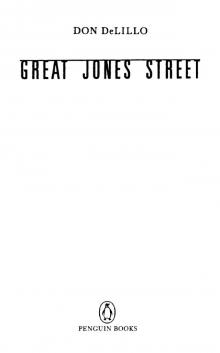 Great Jones Street (Contemporary American Fiction)
Great Jones Street (Contemporary American Fiction)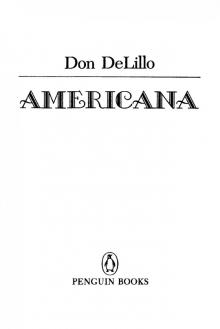 Americana
Americana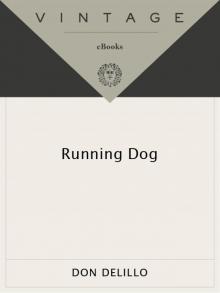 Running Dog
Running Dog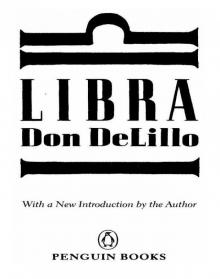 Libra
Libra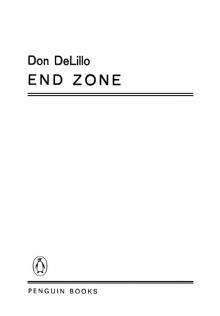 End Zone
End Zone Ratner's Star
Ratner's Star Underworld
Underworld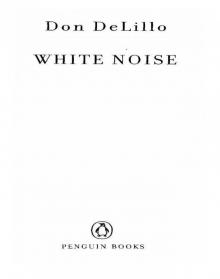 White Noise
White Noise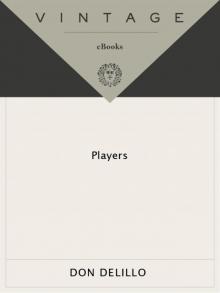 Players
Players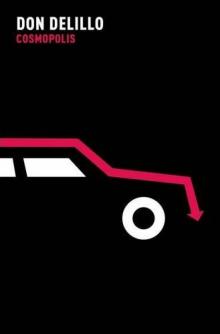 Cosmopolis
Cosmopolis The Silence
The Silence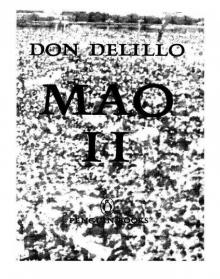 Mao II
Mao II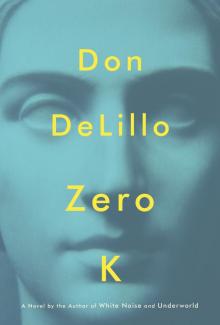 Zero K
Zero K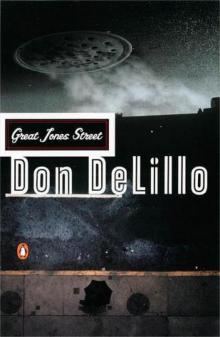 Great Jones Street
Great Jones Street The Angel Esmeralda
The Angel Esmeralda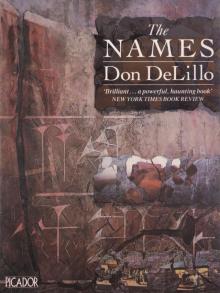 The Names
The Names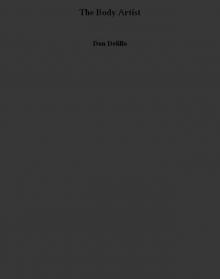 The Body Artist
The Body Artist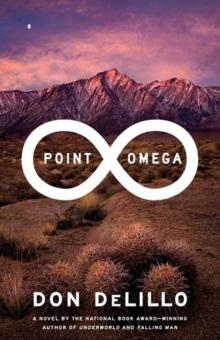 Point Omega
Point Omega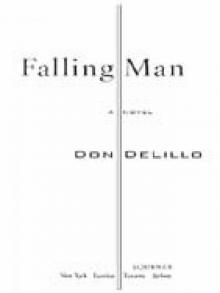 Falling Man
Falling Man